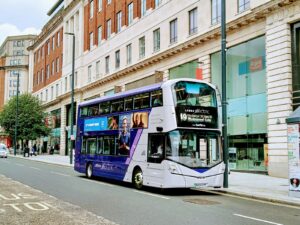A variety of last mile delivery schemes have been launched by councils recently to help reduce the use of the more polluting alternatives. Journalist Emily Whitehouse examines three of them.
In 2022 transport accounted for 34% of all territorial carbon dioxide emissions and the vast majority of that figure was from road transport. 34% represents a return to pre-pandemic levels and while such resilience would be admirable in many other sectors, in this context, it is worrying.
Ironically, the covid lockdown itself is partly responsible for this, having turned previously reluctant internet shoppers onto the benefits of buying online. Post-lockdown, it seems that this new-found enthusiasm for having things delivered remains undiminished – the UK is ranked third for online shopping worldwide – leading to an increase of vans and delivery trucks on the road.
Recognising the scale of the problem, the Local Government Association commissioned research to explore the role of local authorities in ‘co-designing and implementing sustainable local freight solutions for the last mile of parcel deliveries’.
Some local authorities have address the last mile issue head-on and examples of this are particularly evident in London. Inspired by a scheme launched by Westminster City Council in Pimlico, Wandsworth Council recently opened a new ‘micro-logistics hub’ where parcels will be loaded onto e-cargo bikes and delivered locally.
‘Last month we updated our air quality action plan which included a major focus on cycling as we are promoting the use of less cars on roads,’ said a spokesperson from the Council. ‘After seeing the success the e-cargo bike trial scheme was having in Pimlico we decided to trial something similar. As a council we have three community e-cargo bikes available for hire to encourage residents to ditch their cars, but we also want to go the extra mile and promote greener delivery services.’
The council also added the scheme in Pimlico led to a total emissions reduction of 1,613kg of CO2, 6,388g of NOx, and 105g of PM2.5. Furthermore, it was found that cargo bikes were 1.6 times faster than vans.
The cargo bike hub is part of the Defra-funded Smarter Greener logistics project which is run and managed by The Cross River Partnership, something the council are grateful for: ‘it is a huge relief since the cost-of-living crisis has left our budgets stretched, with little room to implement loads of new green projects.’
Hammersmith & Fulham’s ‘Parcels Not Pollution’ scheme which was launched in 2019 has helped more than 100 local businesses switch to using cargo bikes for deliveries around the borough.
Through the scheme, businesses receive free advice and can apply for £1,000 towards purchasing or leasing a cargo bike or 50% off the cost of using a cargo bike service in a two-month period.
Fulham-based ManMaid are recent beneficiaries of the scheme, using electric cargo bikes instead of delivery vans. Their founder Mungo Morgan said: ‘The biggest win with cargo bikes is the parking. Being able to park them right outside is a massive time saving. If we forget a screwdriver we can just pop outside and pick it up’
In London traffic, the fact that cargo bikes can use cycle and bus lanes is also a great advantage: ‘With the heavy traffic and the congestion, during rush hour, we’re ten times quicker than a van would be.’
Hammersmith & Fulham have also launched a shared electric van service for local small and medium businesses, with four vehicles available for use across the borough. The vans are situated in designated spots and businesses who have signed up to the scheme simply use an app to book the time slot in which they’d like to use one.
Whilst the e-cargo bike trials seem to be proving popular in London, another local authority is exploring a more hi-tech route to reduce the number of delivery vehicles on the road, namely Leeds City Council who have rolled out Starship delivery robots. Launched in 2014 by Skype co-founders, Ahti Heinla and Janus Friis, these technologies rely on a mixture of cameras, GPS, and sensors to help them deliver goods such as groceries, food takeaways and packages directly to people’s homes.
Councillor Helen Hayden, Leeds City Council’s executive member for sustainable development and infrastructure said: ‘Despite the government’s recent relaxation on climate change rules, our local authority is more dedicated than ever to becoming net-zero by 2030. One way we are going about this is through introducing Starship delivery robots into different neighbourhoods in the city to ensure less people are using their cars to go to the shops or collect takeaways.
‘We first launched the Starship robot trial in November 2022 in Adel and Tinshill, but after 76% of residents were found to be in support of the idea, we decided to expand the scheme to Kippax and Swarcliffe in July 2023, where even more residents – a shocking 85% – are reported to also be in support of the programme.’
The research that is being conducted in the areas of Leeds where the robots are active is through online surveys that are still open to the public and although the local authority haven’t stumbled upon any major problems yet, they have speculated that these machines may not be suitable for the city centre.
‘The robots provided by Starships can only really work on a maximum two-mile distance and are not currently running in the city centre, which, is where a lot of air pollution is created,’ said Helen. ‘To combat this, businesses have the opportunity to trial an electric cargo bike for up to three months for free as part of the council’s scheme. There are currently four different types of bikes that can be hired with a refundable £200 deposit.’
Leeds City Council is also in the early stages of developing other methods of providing sustainable deliveries in partnership with local businesses. Helen said: ‘We are in early discussion with numerous businesses and logistics providers to understand how we can support a move to more sustainable freight and last mile or urban delivery services.
‘These include using active modes, electric/zero emission vehicles, and other future technologies providers, route optimisation and working with regional and national stakeholders to encourage more freight interchanges to support the transfer from road to rail and waterborne modes.’
The above schemes illustrate that some local authorities recognise the problem and are addressing it, but many are not. Councillors spoken to as part of the LGA’s research acknowledged that local freight is not among their top transport decarbonisation priorities, with active travel, public transport and car-ownership reduction being more pressing policies.
As the research says, ‘Local transport plans have prioritised the mobility of people over the mobility of goods.’ It’s probably time for change.

















Leave a Reply